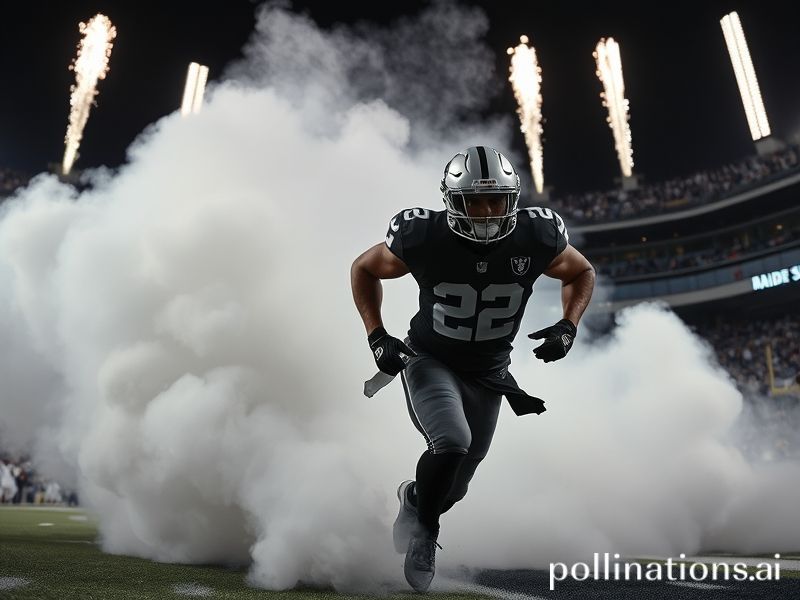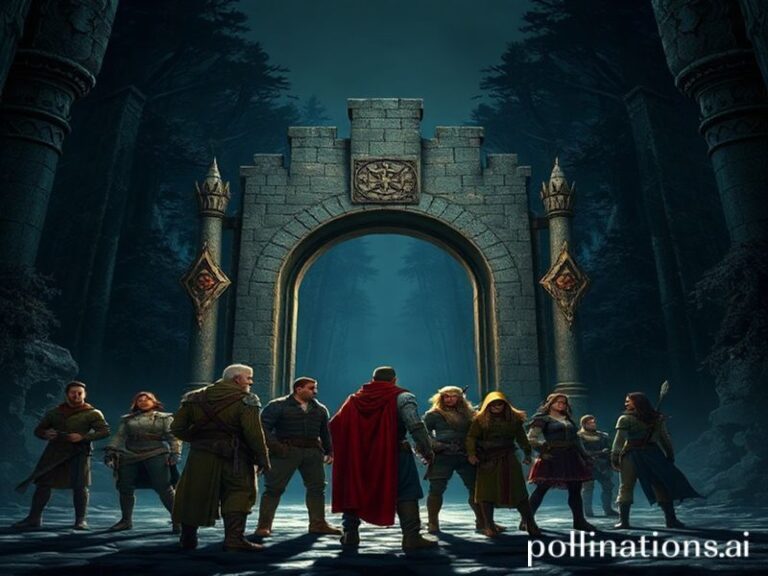Silver, Black, and Green: How the Raiders Game Became a Global Metaphor for Capitalist Chaos
Raiders Game: How a Rust-Bucket Franchise Became a Global Parable of Late-Stage Capitalism
By Our Man in Row Z, Nursing a Warm Beer and Existential Dread
Las Vegas—The Raiders’ 27-20 win over Kansas City last Sunday was more than another over-produced American gladiator match. It was a Rorschach test for a planet that can’t decide whether to watch the world burn or live-tweet it. From betting kiosks in Manila to crypto-funded sports bars in Tallinn, the Raiders’ particular brand of choreographed chaos has become the NFL’s most reliable export: a morality play about loyalty, debt, and the fine print in every relocation clause.
To the uninitiated, the Raiders remain the league’s designated anti-hero—silver-and-black helmets, skull logos, a mascot that looks like it sells NFTs on the side. But peel back the eyeliner and you find a franchise that has perfected the art of monetized instability. Born in Oakland, courted by Los Angeles, divorced by both, then lured to the Nevada desert by $750 million in public subsidies, the team is essentially a leveraged buy-out wearing shoulder pads.
International fans—an audience Roger Goodell is aggressively farming like a Siberian gas field—don’t see regional pride; they see a floating casino with end zones. In Seoul, a Raiders pop-up store sells “Commitment to Excellence” hoodies stitched in Ho Chi Minh City. In Dubai, expats huddle at 3 a.m. to watch games on a yacht rented by a blockchain accelerator whose white paper mentions “community” 47 times and “football” once.
The game itself was peak Raiders: a fourth-quarter fumble returned for a touchdown, a defensive stand that looked suspiciously like luck, and a final kneel-down that emptied sportsbooks from Macau to Malta. Patrick Mahomes threw for 235 yards and three interceptions, proving that even generational talent can be undermined by a supporting cast assembled on Fiverr.
But the real action was in the meta-narrative. Consider the optics: a franchise that sued its own fans for unpaid seat licenses now plays in a $2 billion stadium whose address is literally “1 Raiders Way,” as if directions were necessary for the apocalypse. The Allegiant Air branding on the roof is visible from space, a reminder that late capitalism will slap a logo on your oxygen if the margins are right.
Globally, the Raiders’ appeal lies in their willingness to treat tradition like a depreciating asset. European soccer ultras—who once hurled flares at corporate sponsors—now wear Raiders caps ironically, the same way they adopted Che Guevara T-shirts after Gap started selling them. In Lagos, street vendors hawk bootleg jerseys next to knock-off Balenciaga, capitalism folding in on itself like a Möbius strip.
The broadcast added its own layer of dystopian garnish. Every replay came sponsored by a sports-betting app promising “risk-free” parlays, a phrase economists rank just below “housing bubble” on the credibility index. When the camera cut to Mark Davis—who looks like a Bond villain who lost the plot and found a haircut—it lingered just long enough for viewers to read the fine print: “Odds subject to change; void where regulated.” Translation: we’re all the house, until we’re not.
And yet, 65,000 people paid MGM-adjacent prices to watch millionaires concuss each other for our transient amusement. Somewhere in the stands, a British stag party toasted “American culture” with $18 Bud Lights, blissfully unaware their flight home would be delayed by the same atmospheric rivers now flooding the very city their team abandoned.
The Raiders won, which means nothing and everything. In the parking lot, a Kansas City fan in a Mahomes jersey posed for selfies with Raiders cosplayers, the two tribes united by the universal solvent of content creation. By Tuesday, the highlight reels will be memed in Tagalog, GIF’d in Portuguese, and dissected on a podcast sponsored by a VPN provider promising to hide your location from the very algorithms that recommended the podcast.
Conclusion: The Raiders game is not a sport; it’s a quarterly earnings call with tackling. It teaches that identity is portable, loyalty is negotiable, and every empire—whether Roman, British, or gridiron—eventually moves to Vegas when the tax breaks are sweet enough. Somewhere in the Nevada dusk, the stadium lights dimmed to reveal a horizon of cranes building the next mirage. The final whistle echoed like a punchline no one remembers, but everyone repeats.







